Analysis of Organisational Behaviour at 4Com plc: A Report
VerifiedAdded on 2020/12/29
|14
|4666
|251
Report
AI Summary
This report provides an in-depth analysis of organisational behaviour within 4Com plc, a telecommunications company. The report examines how organisational culture, politics, and power influence individual and team behaviour, performance, and how the company motivates its employee...
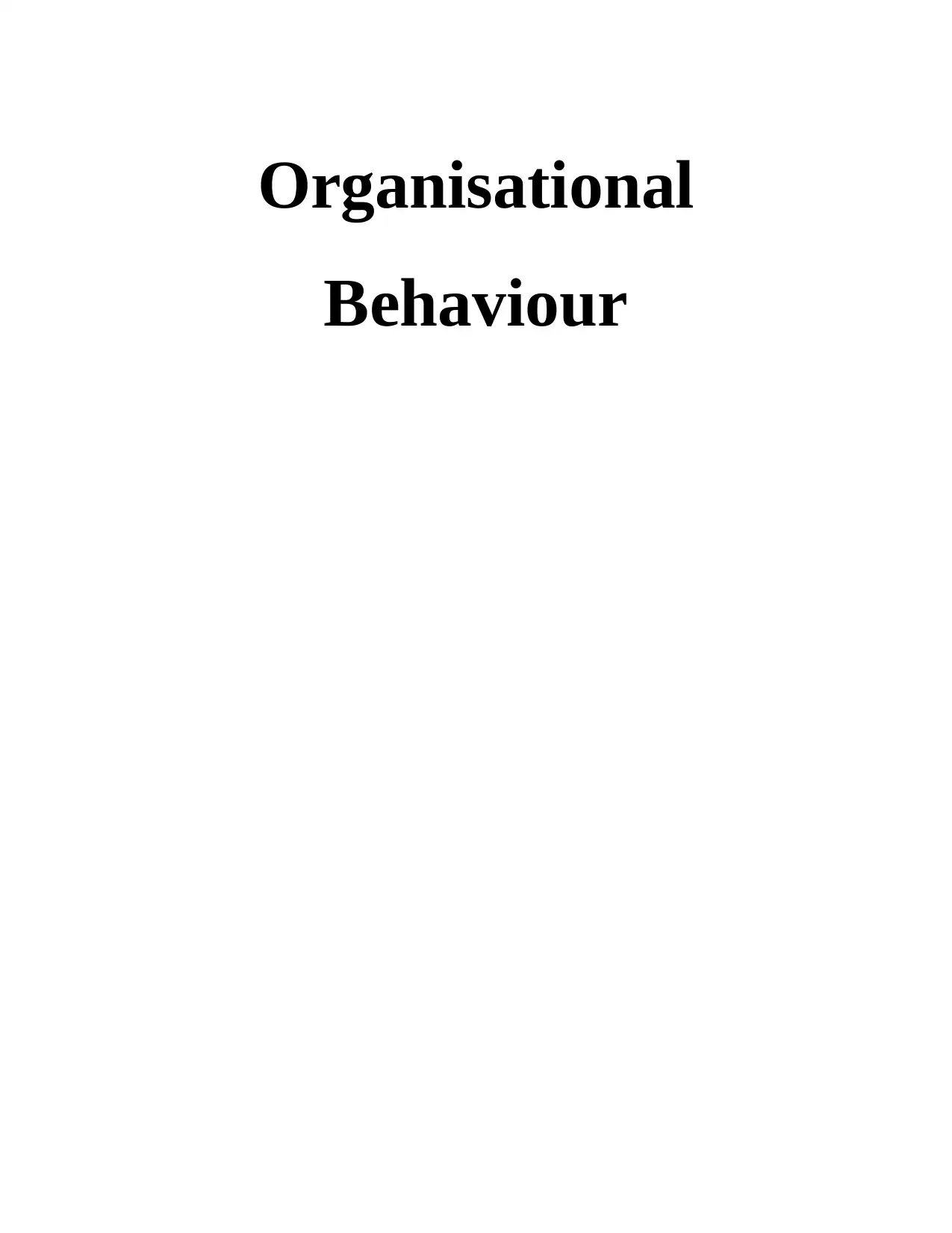
Organisational
Behaviour
Behaviour
Paraphrase This Document
Need a fresh take? Get an instant paraphrase of this document with our AI Paraphraser
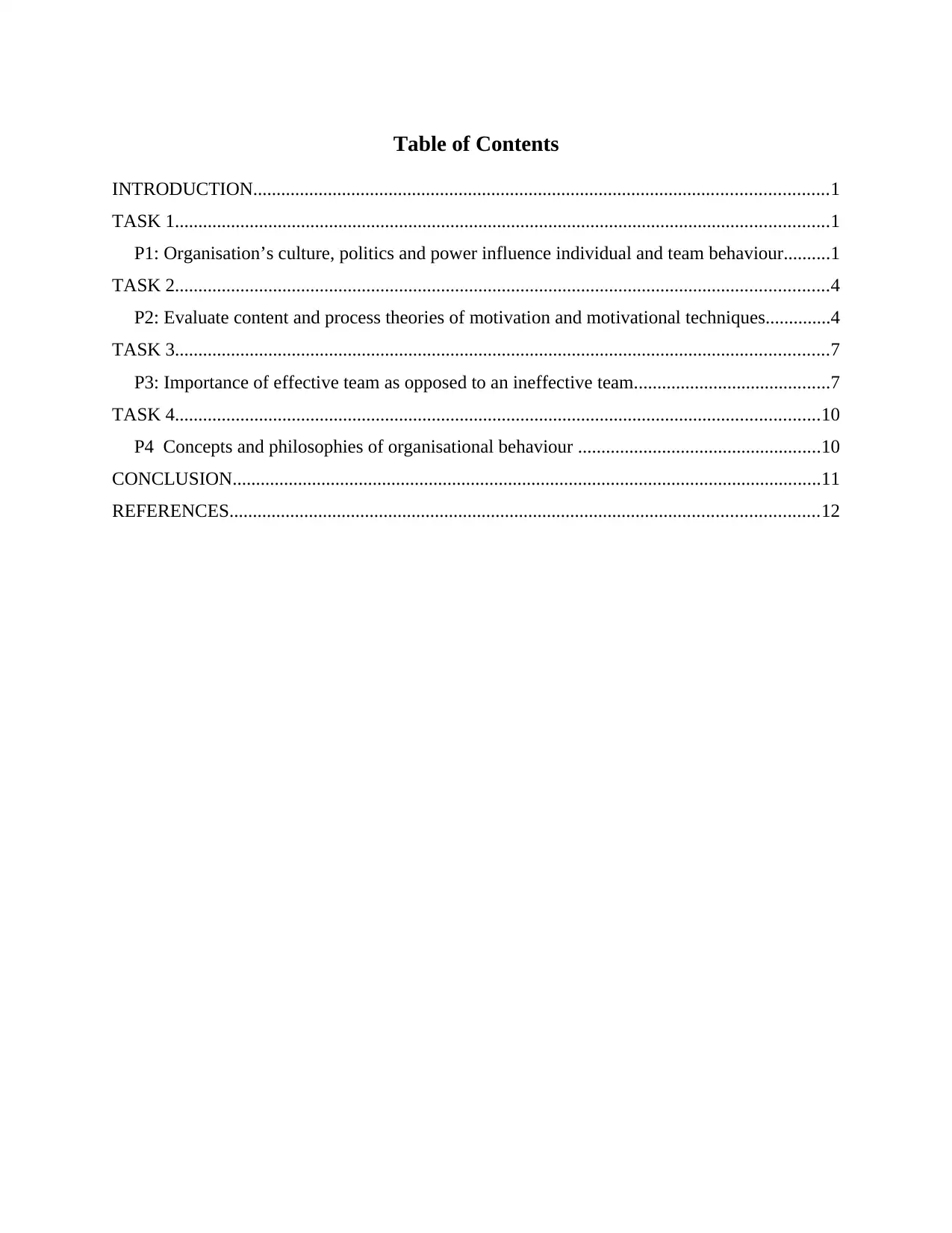
Table of Contents
INTRODUCTION...........................................................................................................................1
TASK 1............................................................................................................................................1
P1: Organisation’s culture, politics and power influence individual and team behaviour..........1
TASK 2............................................................................................................................................4
P2: Evaluate content and process theories of motivation and motivational techniques..............4
TASK 3............................................................................................................................................7
P3: Importance of effective team as opposed to an ineffective team..........................................7
TASK 4..........................................................................................................................................10
P4 Concepts and philosophies of organisational behaviour ....................................................10
CONCLUSION..............................................................................................................................11
REFERENCES..............................................................................................................................12
INTRODUCTION...........................................................................................................................1
TASK 1............................................................................................................................................1
P1: Organisation’s culture, politics and power influence individual and team behaviour..........1
TASK 2............................................................................................................................................4
P2: Evaluate content and process theories of motivation and motivational techniques..............4
TASK 3............................................................................................................................................7
P3: Importance of effective team as opposed to an ineffective team..........................................7
TASK 4..........................................................................................................................................10
P4 Concepts and philosophies of organisational behaviour ....................................................10
CONCLUSION..............................................................................................................................11
REFERENCES..............................................................................................................................12
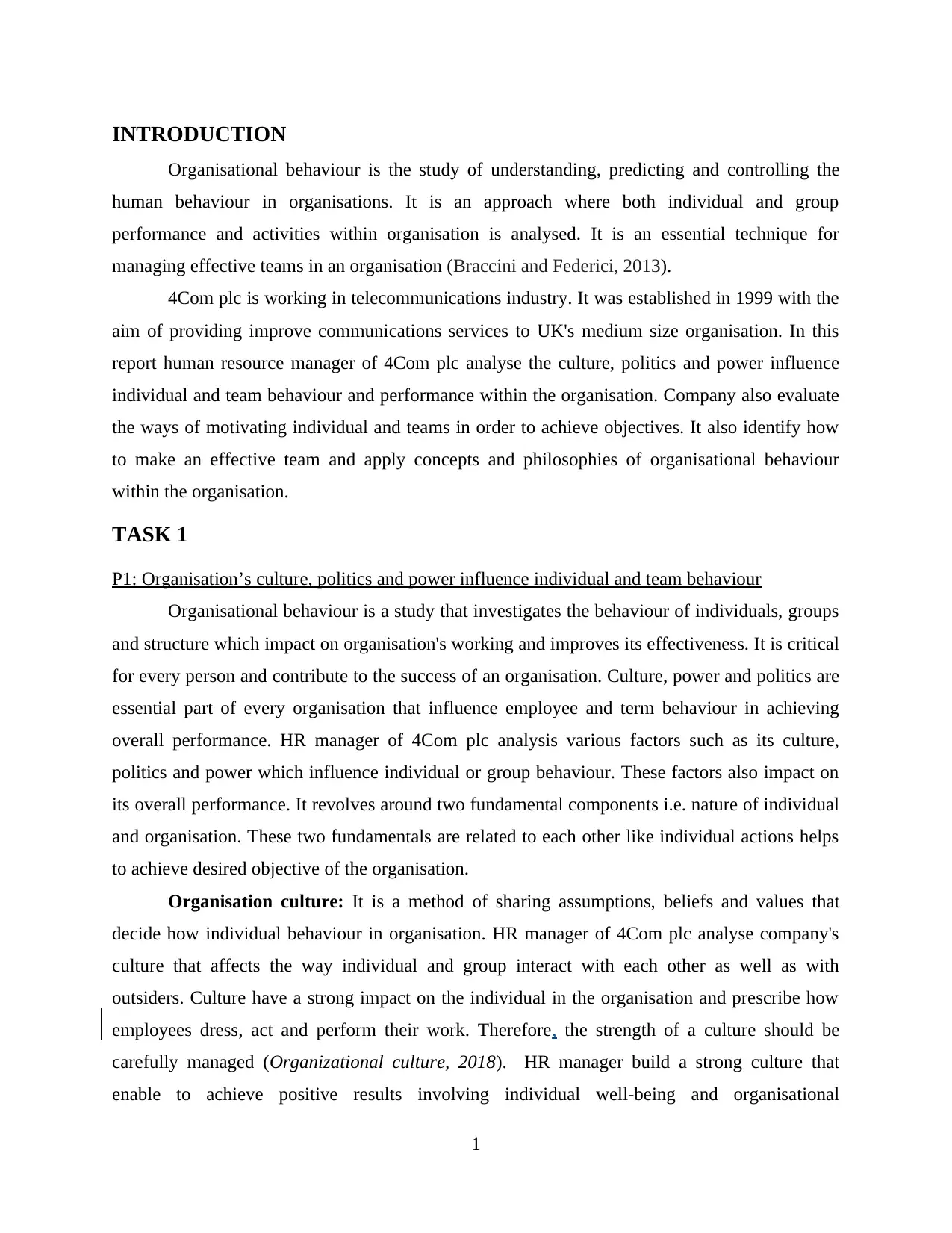
INTRODUCTION
Organisational behaviour is the study of understanding, predicting and controlling the
human behaviour in organisations. It is an approach where both individual and group
performance and activities within organisation is analysed. It is an essential technique for
managing effective teams in an organisation (Braccini and Federici, 2013).
4Com plc is working in telecommunications industry. It was established in 1999 with the
aim of providing improve communications services to UK's medium size organisation. In this
report human resource manager of 4Com plc analyse the culture, politics and power influence
individual and team behaviour and performance within the organisation. Company also evaluate
the ways of motivating individual and teams in order to achieve objectives. It also identify how
to make an effective team and apply concepts and philosophies of organisational behaviour
within the organisation.
TASK 1
P1: Organisation’s culture, politics and power influence individual and team behaviour
Organisational behaviour is a study that investigates the behaviour of individuals, groups
and structure which impact on organisation's working and improves its effectiveness. It is critical
for every person and contribute to the success of an organisation. Culture, power and politics are
essential part of every organisation that influence employee and term behaviour in achieving
overall performance. HR manager of 4Com plc analysis various factors such as its culture,
politics and power which influence individual or group behaviour. These factors also impact on
its overall performance. It revolves around two fundamental components i.e. nature of individual
and organisation. These two fundamentals are related to each other like individual actions helps
to achieve desired objective of the organisation.
Organisation culture: It is a method of sharing assumptions, beliefs and values that
decide how individual behaviour in organisation. HR manager of 4Com plc analyse company's
culture that affects the way individual and group interact with each other as well as with
outsiders. Culture have a strong impact on the individual in the organisation and prescribe how
employees dress, act and perform their work. Therefore, the strength of a culture should be
carefully managed (Organizational culture, 2018). HR manager build a strong culture that
enable to achieve positive results involving individual well-being and organisational
1
Organisational behaviour is the study of understanding, predicting and controlling the
human behaviour in organisations. It is an approach where both individual and group
performance and activities within organisation is analysed. It is an essential technique for
managing effective teams in an organisation (Braccini and Federici, 2013).
4Com plc is working in telecommunications industry. It was established in 1999 with the
aim of providing improve communications services to UK's medium size organisation. In this
report human resource manager of 4Com plc analyse the culture, politics and power influence
individual and team behaviour and performance within the organisation. Company also evaluate
the ways of motivating individual and teams in order to achieve objectives. It also identify how
to make an effective team and apply concepts and philosophies of organisational behaviour
within the organisation.
TASK 1
P1: Organisation’s culture, politics and power influence individual and team behaviour
Organisational behaviour is a study that investigates the behaviour of individuals, groups
and structure which impact on organisation's working and improves its effectiveness. It is critical
for every person and contribute to the success of an organisation. Culture, power and politics are
essential part of every organisation that influence employee and term behaviour in achieving
overall performance. HR manager of 4Com plc analysis various factors such as its culture,
politics and power which influence individual or group behaviour. These factors also impact on
its overall performance. It revolves around two fundamental components i.e. nature of individual
and organisation. These two fundamentals are related to each other like individual actions helps
to achieve desired objective of the organisation.
Organisation culture: It is a method of sharing assumptions, beliefs and values that
decide how individual behaviour in organisation. HR manager of 4Com plc analyse company's
culture that affects the way individual and group interact with each other as well as with
outsiders. Culture have a strong impact on the individual in the organisation and prescribe how
employees dress, act and perform their work. Therefore, the strength of a culture should be
carefully managed (Organizational culture, 2018). HR manager build a strong culture that
enable to achieve positive results involving individual well-being and organisational
1
⊘ This is a preview!⊘
Do you want full access?
Subscribe today to unlock all pages.

Trusted by 1+ million students worldwide
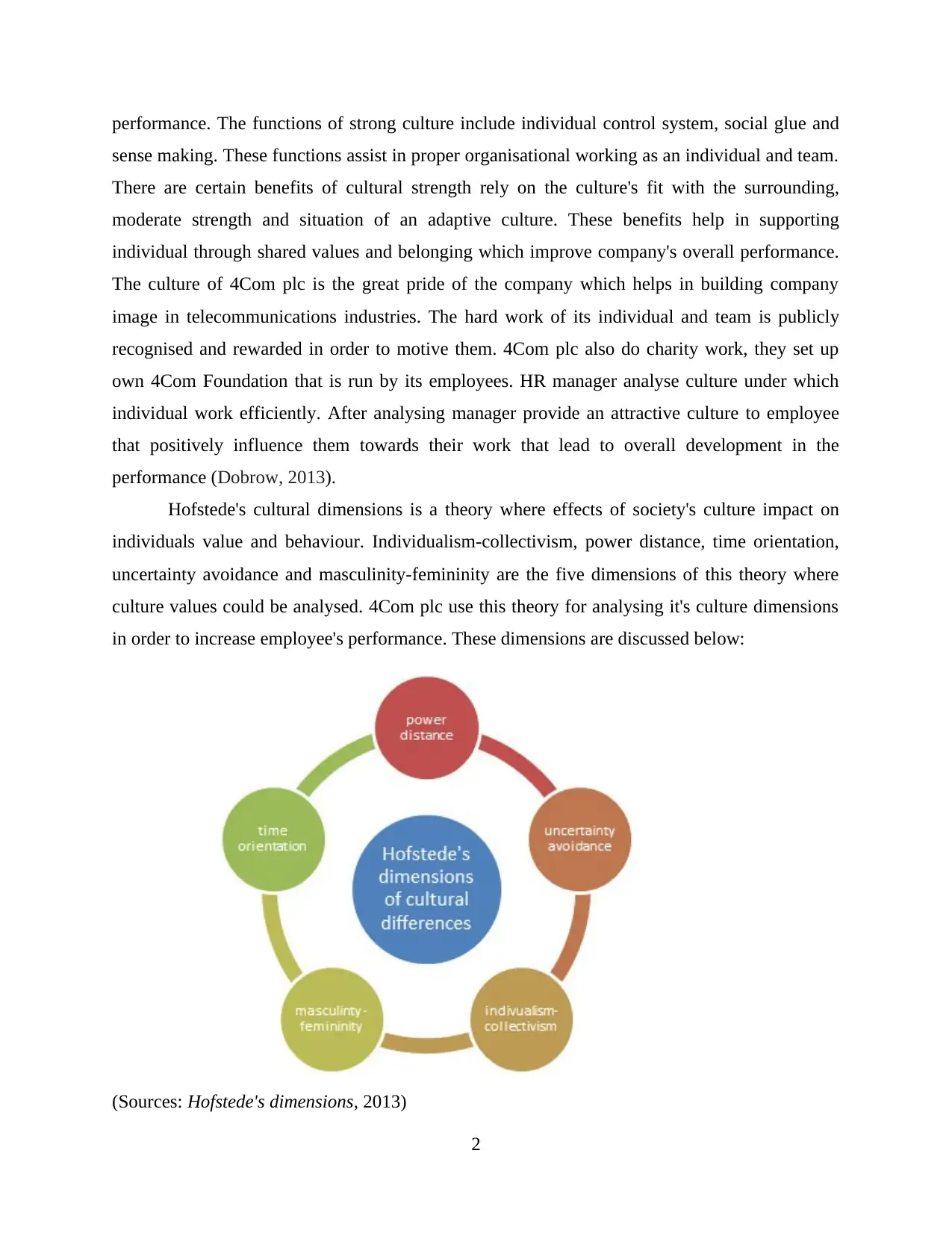
performance. The functions of strong culture include individual control system, social glue and
sense making. These functions assist in proper organisational working as an individual and team.
There are certain benefits of cultural strength rely on the culture's fit with the surrounding,
moderate strength and situation of an adaptive culture. These benefits help in supporting
individual through shared values and belonging which improve company's overall performance.
The culture of 4Com plc is the great pride of the company which helps in building company
image in telecommunications industries. The hard work of its individual and team is publicly
recognised and rewarded in order to motive them. 4Com plc also do charity work, they set up
own 4Com Foundation that is run by its employees. HR manager analyse culture under which
individual work efficiently. After analysing manager provide an attractive culture to employee
that positively influence them towards their work that lead to overall development in the
performance (Dobrow, 2013).
Hofstede's cultural dimensions is a theory where effects of society's culture impact on
individuals value and behaviour. Individualism-collectivism, power distance, time orientation,
uncertainty avoidance and masculinity-femininity are the five dimensions of this theory where
culture values could be analysed. 4Com plc use this theory for analysing it's culture dimensions
in order to increase employee's performance. These dimensions are discussed below:
(Sources: Hofstede's dimensions, 2013)
2
sense making. These functions assist in proper organisational working as an individual and team.
There are certain benefits of cultural strength rely on the culture's fit with the surrounding,
moderate strength and situation of an adaptive culture. These benefits help in supporting
individual through shared values and belonging which improve company's overall performance.
The culture of 4Com plc is the great pride of the company which helps in building company
image in telecommunications industries. The hard work of its individual and team is publicly
recognised and rewarded in order to motive them. 4Com plc also do charity work, they set up
own 4Com Foundation that is run by its employees. HR manager analyse culture under which
individual work efficiently. After analysing manager provide an attractive culture to employee
that positively influence them towards their work that lead to overall development in the
performance (Dobrow, 2013).
Hofstede's cultural dimensions is a theory where effects of society's culture impact on
individuals value and behaviour. Individualism-collectivism, power distance, time orientation,
uncertainty avoidance and masculinity-femininity are the five dimensions of this theory where
culture values could be analysed. 4Com plc use this theory for analysing it's culture dimensions
in order to increase employee's performance. These dimensions are discussed below:
(Sources: Hofstede's dimensions, 2013)
2
Paraphrase This Document
Need a fresh take? Get an instant paraphrase of this document with our AI Paraphraser
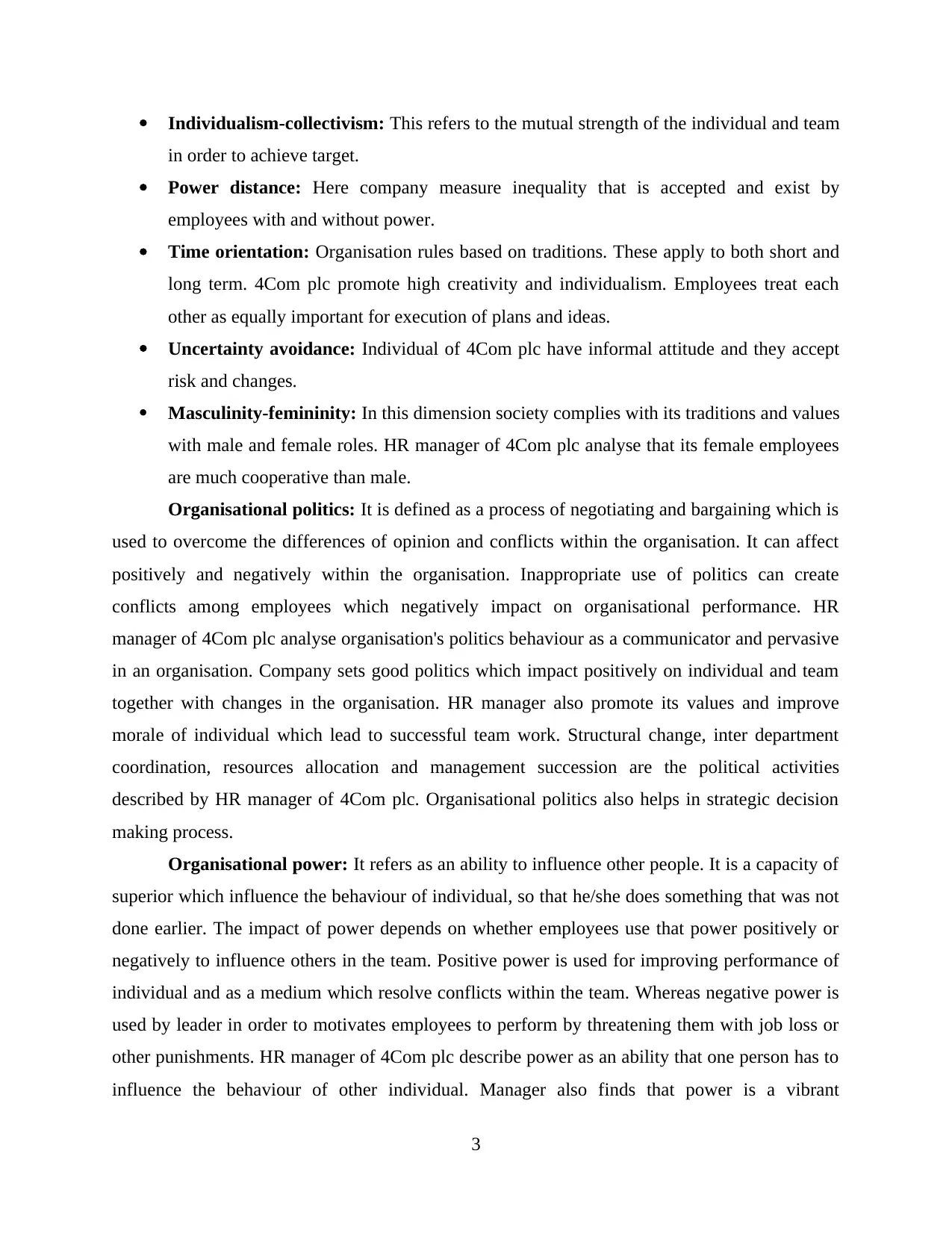
Individualism-collectivism: This refers to the mutual strength of the individual and team
in order to achieve target.
Power distance: Here company measure inequality that is accepted and exist by
employees with and without power.
Time orientation: Organisation rules based on traditions. These apply to both short and
long term. 4Com plc promote high creativity and individualism. Employees treat each
other as equally important for execution of plans and ideas.
Uncertainty avoidance: Individual of 4Com plc have informal attitude and they accept
risk and changes.
Masculinity-femininity: In this dimension society complies with its traditions and values
with male and female roles. HR manager of 4Com plc analyse that its female employees
are much cooperative than male.
Organisational politics: It is defined as a process of negotiating and bargaining which is
used to overcome the differences of opinion and conflicts within the organisation. It can affect
positively and negatively within the organisation. Inappropriate use of politics can create
conflicts among employees which negatively impact on organisational performance. HR
manager of 4Com plc analyse organisation's politics behaviour as a communicator and pervasive
in an organisation. Company sets good politics which impact positively on individual and team
together with changes in the organisation. HR manager also promote its values and improve
morale of individual which lead to successful team work. Structural change, inter department
coordination, resources allocation and management succession are the political activities
described by HR manager of 4Com plc. Organisational politics also helps in strategic decision
making process.
Organisational power: It refers as an ability to influence other people. It is a capacity of
superior which influence the behaviour of individual, so that he/she does something that was not
done earlier. The impact of power depends on whether employees use that power positively or
negatively to influence others in the team. Positive power is used for improving performance of
individual and as a medium which resolve conflicts within the team. Whereas negative power is
used by leader in order to motivates employees to perform by threatening them with job loss or
other punishments. HR manager of 4Com plc describe power as an ability that one person has to
influence the behaviour of other individual. Manager also finds that power is a vibrant
3
in order to achieve target.
Power distance: Here company measure inequality that is accepted and exist by
employees with and without power.
Time orientation: Organisation rules based on traditions. These apply to both short and
long term. 4Com plc promote high creativity and individualism. Employees treat each
other as equally important for execution of plans and ideas.
Uncertainty avoidance: Individual of 4Com plc have informal attitude and they accept
risk and changes.
Masculinity-femininity: In this dimension society complies with its traditions and values
with male and female roles. HR manager of 4Com plc analyse that its female employees
are much cooperative than male.
Organisational politics: It is defined as a process of negotiating and bargaining which is
used to overcome the differences of opinion and conflicts within the organisation. It can affect
positively and negatively within the organisation. Inappropriate use of politics can create
conflicts among employees which negatively impact on organisational performance. HR
manager of 4Com plc analyse organisation's politics behaviour as a communicator and pervasive
in an organisation. Company sets good politics which impact positively on individual and team
together with changes in the organisation. HR manager also promote its values and improve
morale of individual which lead to successful team work. Structural change, inter department
coordination, resources allocation and management succession are the political activities
described by HR manager of 4Com plc. Organisational politics also helps in strategic decision
making process.
Organisational power: It refers as an ability to influence other people. It is a capacity of
superior which influence the behaviour of individual, so that he/she does something that was not
done earlier. The impact of power depends on whether employees use that power positively or
negatively to influence others in the team. Positive power is used for improving performance of
individual and as a medium which resolve conflicts within the team. Whereas negative power is
used by leader in order to motivates employees to perform by threatening them with job loss or
other punishments. HR manager of 4Com plc describe power as an ability that one person has to
influence the behaviour of other individual. Manager also finds that power is a vibrant
3
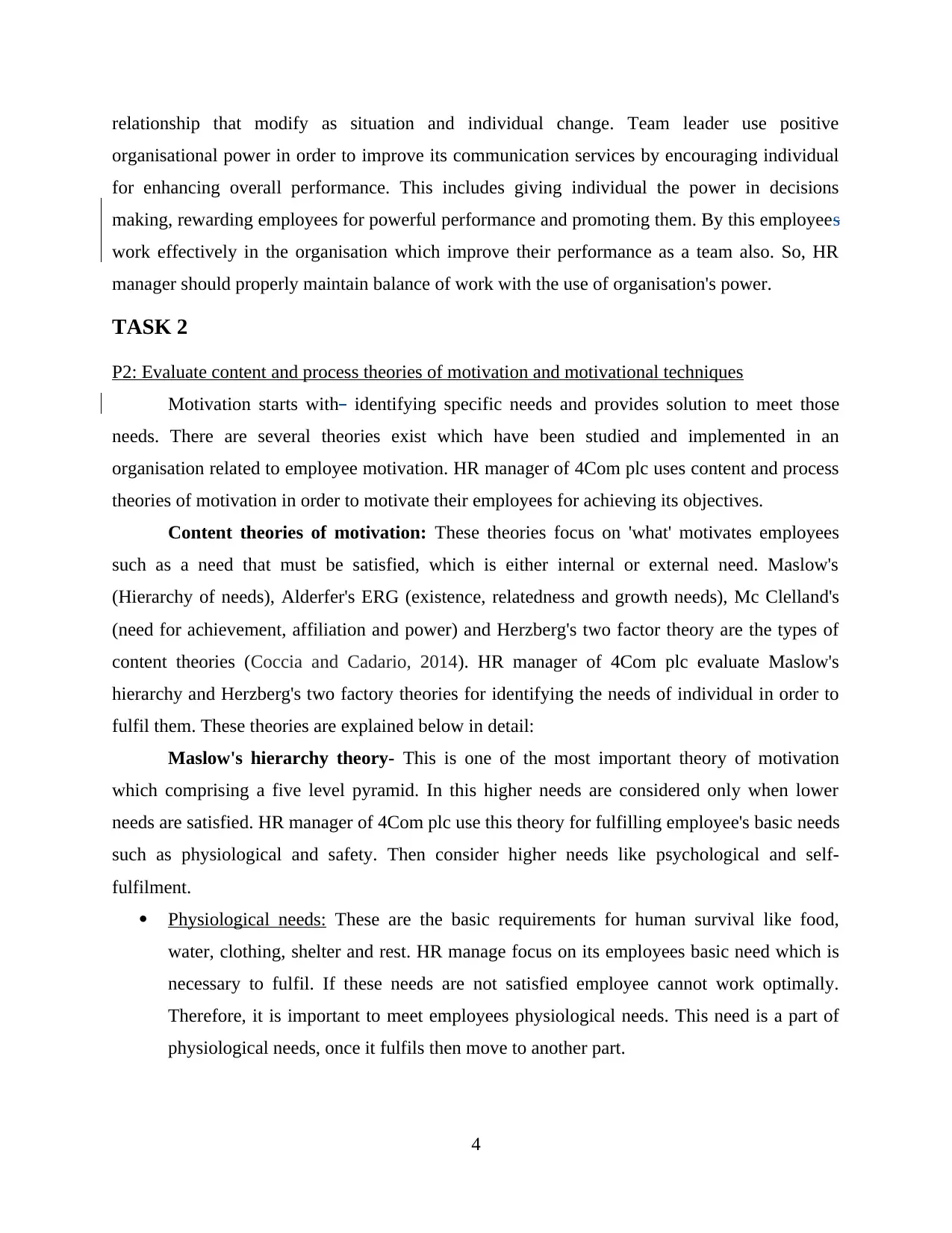
relationship that modify as situation and individual change. Team leader use positive
organisational power in order to improve its communication services by encouraging individual
for enhancing overall performance. This includes giving individual the power in decisions
making, rewarding employees for powerful performance and promoting them. By this employees
work effectively in the organisation which improve their performance as a team also. So, HR
manager should properly maintain balance of work with the use of organisation's power.
TASK 2
P2: Evaluate content and process theories of motivation and motivational techniques
Motivation starts with identifying specific needs and provides solution to meet those
needs. There are several theories exist which have been studied and implemented in an
organisation related to employee motivation. HR manager of 4Com plc uses content and process
theories of motivation in order to motivate their employees for achieving its objectives.
Content theories of motivation: These theories focus on 'what' motivates employees
such as a need that must be satisfied, which is either internal or external need. Maslow's
(Hierarchy of needs), Alderfer's ERG (existence, relatedness and growth needs), Mc Clelland's
(need for achievement, affiliation and power) and Herzberg's two factor theory are the types of
content theories (Coccia and Cadario, 2014). HR manager of 4Com plc evaluate Maslow's
hierarchy and Herzberg's two factory theories for identifying the needs of individual in order to
fulfil them. These theories are explained below in detail:
Maslow's hierarchy theory- This is one of the most important theory of motivation
which comprising a five level pyramid. In this higher needs are considered only when lower
needs are satisfied. HR manager of 4Com plc use this theory for fulfilling employee's basic needs
such as physiological and safety. Then consider higher needs like psychological and self-
fulfilment.
Physiological needs: These are the basic requirements for human survival like food,
water, clothing, shelter and rest. HR manage focus on its employees basic need which is
necessary to fulfil. If these needs are not satisfied employee cannot work optimally.
Therefore, it is important to meet employees physiological needs. This need is a part of
physiological needs, once it fulfils then move to another part.
4
organisational power in order to improve its communication services by encouraging individual
for enhancing overall performance. This includes giving individual the power in decisions
making, rewarding employees for powerful performance and promoting them. By this employees
work effectively in the organisation which improve their performance as a team also. So, HR
manager should properly maintain balance of work with the use of organisation's power.
TASK 2
P2: Evaluate content and process theories of motivation and motivational techniques
Motivation starts with identifying specific needs and provides solution to meet those
needs. There are several theories exist which have been studied and implemented in an
organisation related to employee motivation. HR manager of 4Com plc uses content and process
theories of motivation in order to motivate their employees for achieving its objectives.
Content theories of motivation: These theories focus on 'what' motivates employees
such as a need that must be satisfied, which is either internal or external need. Maslow's
(Hierarchy of needs), Alderfer's ERG (existence, relatedness and growth needs), Mc Clelland's
(need for achievement, affiliation and power) and Herzberg's two factor theory are the types of
content theories (Coccia and Cadario, 2014). HR manager of 4Com plc evaluate Maslow's
hierarchy and Herzberg's two factory theories for identifying the needs of individual in order to
fulfil them. These theories are explained below in detail:
Maslow's hierarchy theory- This is one of the most important theory of motivation
which comprising a five level pyramid. In this higher needs are considered only when lower
needs are satisfied. HR manager of 4Com plc use this theory for fulfilling employee's basic needs
such as physiological and safety. Then consider higher needs like psychological and self-
fulfilment.
Physiological needs: These are the basic requirements for human survival like food,
water, clothing, shelter and rest. HR manage focus on its employees basic need which is
necessary to fulfil. If these needs are not satisfied employee cannot work optimally.
Therefore, it is important to meet employees physiological needs. This need is a part of
physiological needs, once it fulfils then move to another part.
4
⊘ This is a preview!⊘
Do you want full access?
Subscribe today to unlock all pages.

Trusted by 1+ million students worldwide
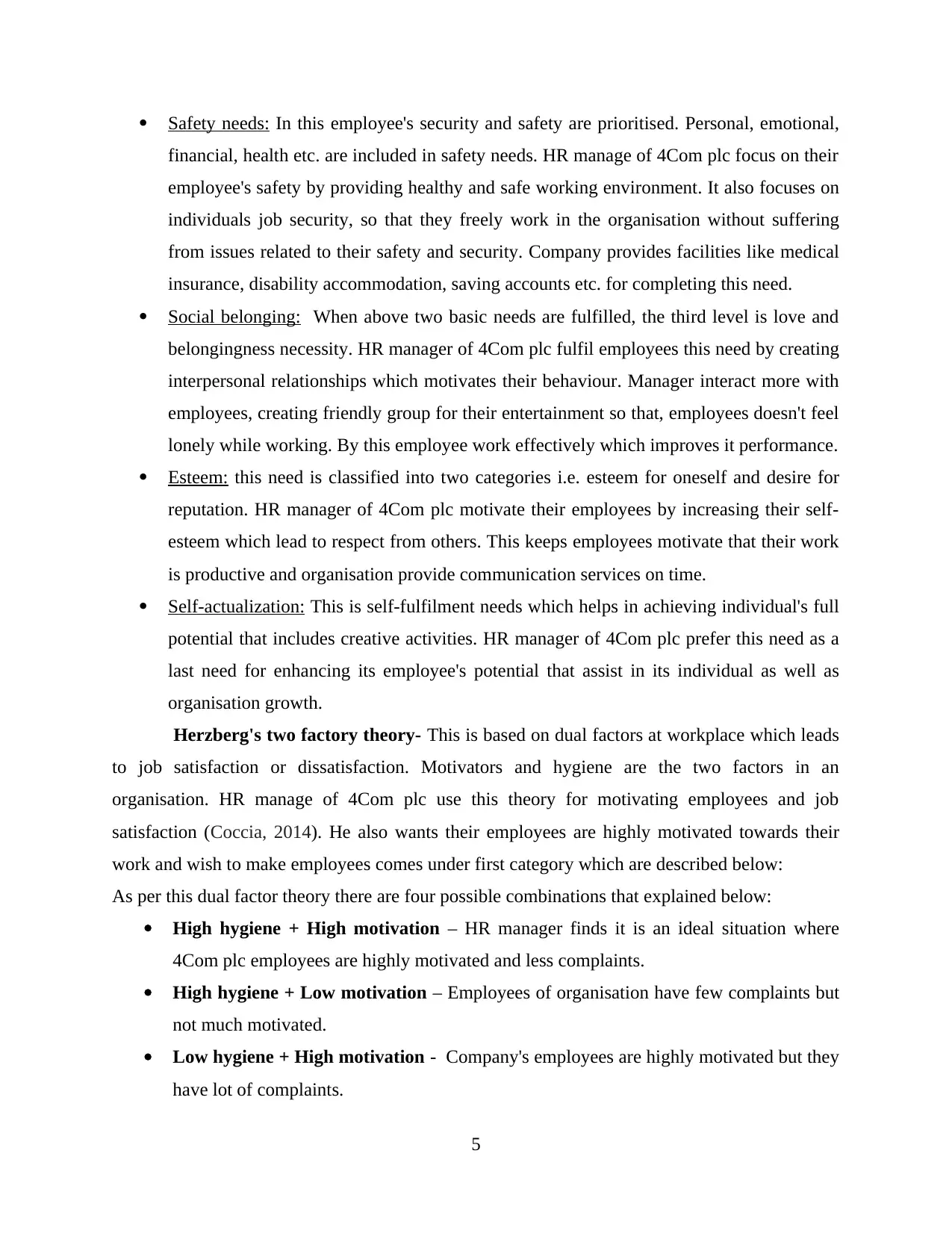
Safety needs: In this employee's security and safety are prioritised. Personal, emotional,
financial, health etc. are included in safety needs. HR manage of 4Com plc focus on their
employee's safety by providing healthy and safe working environment. It also focuses on
individuals job security, so that they freely work in the organisation without suffering
from issues related to their safety and security. Company provides facilities like medical
insurance, disability accommodation, saving accounts etc. for completing this need.
Social belonging: When above two basic needs are fulfilled, the third level is love and
belongingness necessity. HR manager of 4Com plc fulfil employees this need by creating
interpersonal relationships which motivates their behaviour. Manager interact more with
employees, creating friendly group for their entertainment so that, employees doesn't feel
lonely while working. By this employee work effectively which improves it performance.
Esteem: this need is classified into two categories i.e. esteem for oneself and desire for
reputation. HR manager of 4Com plc motivate their employees by increasing their self-
esteem which lead to respect from others. This keeps employees motivate that their work
is productive and organisation provide communication services on time.
Self-actualization: This is self-fulfilment needs which helps in achieving individual's full
potential that includes creative activities. HR manager of 4Com plc prefer this need as a
last need for enhancing its employee's potential that assist in its individual as well as
organisation growth.
Herzberg's two factory theory- This is based on dual factors at workplace which leads
to job satisfaction or dissatisfaction. Motivators and hygiene are the two factors in an
organisation. HR manage of 4Com plc use this theory for motivating employees and job
satisfaction (Coccia, 2014). He also wants their employees are highly motivated towards their
work and wish to make employees comes under first category which are described below:
As per this dual factor theory there are four possible combinations that explained below:
High hygiene + High motivation – HR manager finds it is an ideal situation where
4Com plc employees are highly motivated and less complaints.
High hygiene + Low motivation – Employees of organisation have few complaints but
not much motivated.
Low hygiene + High motivation - Company's employees are highly motivated but they
have lot of complaints.
5
financial, health etc. are included in safety needs. HR manage of 4Com plc focus on their
employee's safety by providing healthy and safe working environment. It also focuses on
individuals job security, so that they freely work in the organisation without suffering
from issues related to their safety and security. Company provides facilities like medical
insurance, disability accommodation, saving accounts etc. for completing this need.
Social belonging: When above two basic needs are fulfilled, the third level is love and
belongingness necessity. HR manager of 4Com plc fulfil employees this need by creating
interpersonal relationships which motivates their behaviour. Manager interact more with
employees, creating friendly group for their entertainment so that, employees doesn't feel
lonely while working. By this employee work effectively which improves it performance.
Esteem: this need is classified into two categories i.e. esteem for oneself and desire for
reputation. HR manager of 4Com plc motivate their employees by increasing their self-
esteem which lead to respect from others. This keeps employees motivate that their work
is productive and organisation provide communication services on time.
Self-actualization: This is self-fulfilment needs which helps in achieving individual's full
potential that includes creative activities. HR manager of 4Com plc prefer this need as a
last need for enhancing its employee's potential that assist in its individual as well as
organisation growth.
Herzberg's two factory theory- This is based on dual factors at workplace which leads
to job satisfaction or dissatisfaction. Motivators and hygiene are the two factors in an
organisation. HR manage of 4Com plc use this theory for motivating employees and job
satisfaction (Coccia, 2014). He also wants their employees are highly motivated towards their
work and wish to make employees comes under first category which are described below:
As per this dual factor theory there are four possible combinations that explained below:
High hygiene + High motivation – HR manager finds it is an ideal situation where
4Com plc employees are highly motivated and less complaints.
High hygiene + Low motivation – Employees of organisation have few complaints but
not much motivated.
Low hygiene + High motivation - Company's employees are highly motivated but they
have lot of complaints.
5
Paraphrase This Document
Need a fresh take? Get an instant paraphrase of this document with our AI Paraphraser
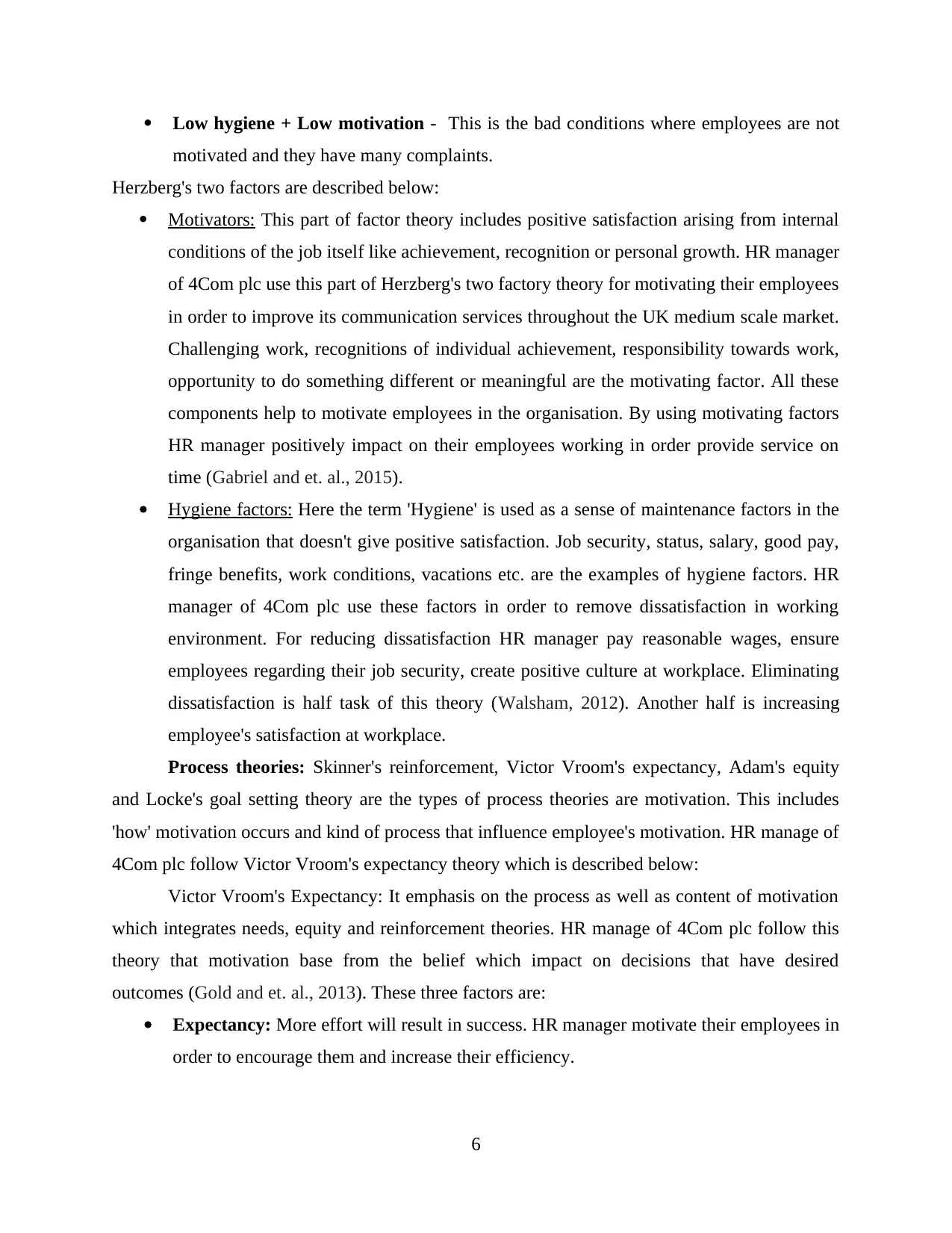
Low hygiene + Low motivation - This is the bad conditions where employees are not
motivated and they have many complaints.
Herzberg's two factors are described below:
Motivators: This part of factor theory includes positive satisfaction arising from internal
conditions of the job itself like achievement, recognition or personal growth. HR manager
of 4Com plc use this part of Herzberg's two factory theory for motivating their employees
in order to improve its communication services throughout the UK medium scale market.
Challenging work, recognitions of individual achievement, responsibility towards work,
opportunity to do something different or meaningful are the motivating factor. All these
components help to motivate employees in the organisation. By using motivating factors
HR manager positively impact on their employees working in order provide service on
time (Gabriel and et. al., 2015).
Hygiene factors: Here the term 'Hygiene' is used as a sense of maintenance factors in the
organisation that doesn't give positive satisfaction. Job security, status, salary, good pay,
fringe benefits, work conditions, vacations etc. are the examples of hygiene factors. HR
manager of 4Com plc use these factors in order to remove dissatisfaction in working
environment. For reducing dissatisfaction HR manager pay reasonable wages, ensure
employees regarding their job security, create positive culture at workplace. Eliminating
dissatisfaction is half task of this theory (Walsham, 2012). Another half is increasing
employee's satisfaction at workplace.
Process theories: Skinner's reinforcement, Victor Vroom's expectancy, Adam's equity
and Locke's goal setting theory are the types of process theories are motivation. This includes
'how' motivation occurs and kind of process that influence employee's motivation. HR manage of
4Com plc follow Victor Vroom's expectancy theory which is described below:
Victor Vroom's Expectancy: It emphasis on the process as well as content of motivation
which integrates needs, equity and reinforcement theories. HR manage of 4Com plc follow this
theory that motivation base from the belief which impact on decisions that have desired
outcomes (Gold and et. al., 2013). These three factors are:
Expectancy: More effort will result in success. HR manager motivate their employees in
order to encourage them and increase their efficiency.
6
motivated and they have many complaints.
Herzberg's two factors are described below:
Motivators: This part of factor theory includes positive satisfaction arising from internal
conditions of the job itself like achievement, recognition or personal growth. HR manager
of 4Com plc use this part of Herzberg's two factory theory for motivating their employees
in order to improve its communication services throughout the UK medium scale market.
Challenging work, recognitions of individual achievement, responsibility towards work,
opportunity to do something different or meaningful are the motivating factor. All these
components help to motivate employees in the organisation. By using motivating factors
HR manager positively impact on their employees working in order provide service on
time (Gabriel and et. al., 2015).
Hygiene factors: Here the term 'Hygiene' is used as a sense of maintenance factors in the
organisation that doesn't give positive satisfaction. Job security, status, salary, good pay,
fringe benefits, work conditions, vacations etc. are the examples of hygiene factors. HR
manager of 4Com plc use these factors in order to remove dissatisfaction in working
environment. For reducing dissatisfaction HR manager pay reasonable wages, ensure
employees regarding their job security, create positive culture at workplace. Eliminating
dissatisfaction is half task of this theory (Walsham, 2012). Another half is increasing
employee's satisfaction at workplace.
Process theories: Skinner's reinforcement, Victor Vroom's expectancy, Adam's equity
and Locke's goal setting theory are the types of process theories are motivation. This includes
'how' motivation occurs and kind of process that influence employee's motivation. HR manage of
4Com plc follow Victor Vroom's expectancy theory which is described below:
Victor Vroom's Expectancy: It emphasis on the process as well as content of motivation
which integrates needs, equity and reinforcement theories. HR manage of 4Com plc follow this
theory that motivation base from the belief which impact on decisions that have desired
outcomes (Gold and et. al., 2013). These three factors are:
Expectancy: More effort will result in success. HR manager motivate their employees in
order to encourage them and increase their efficiency.
6
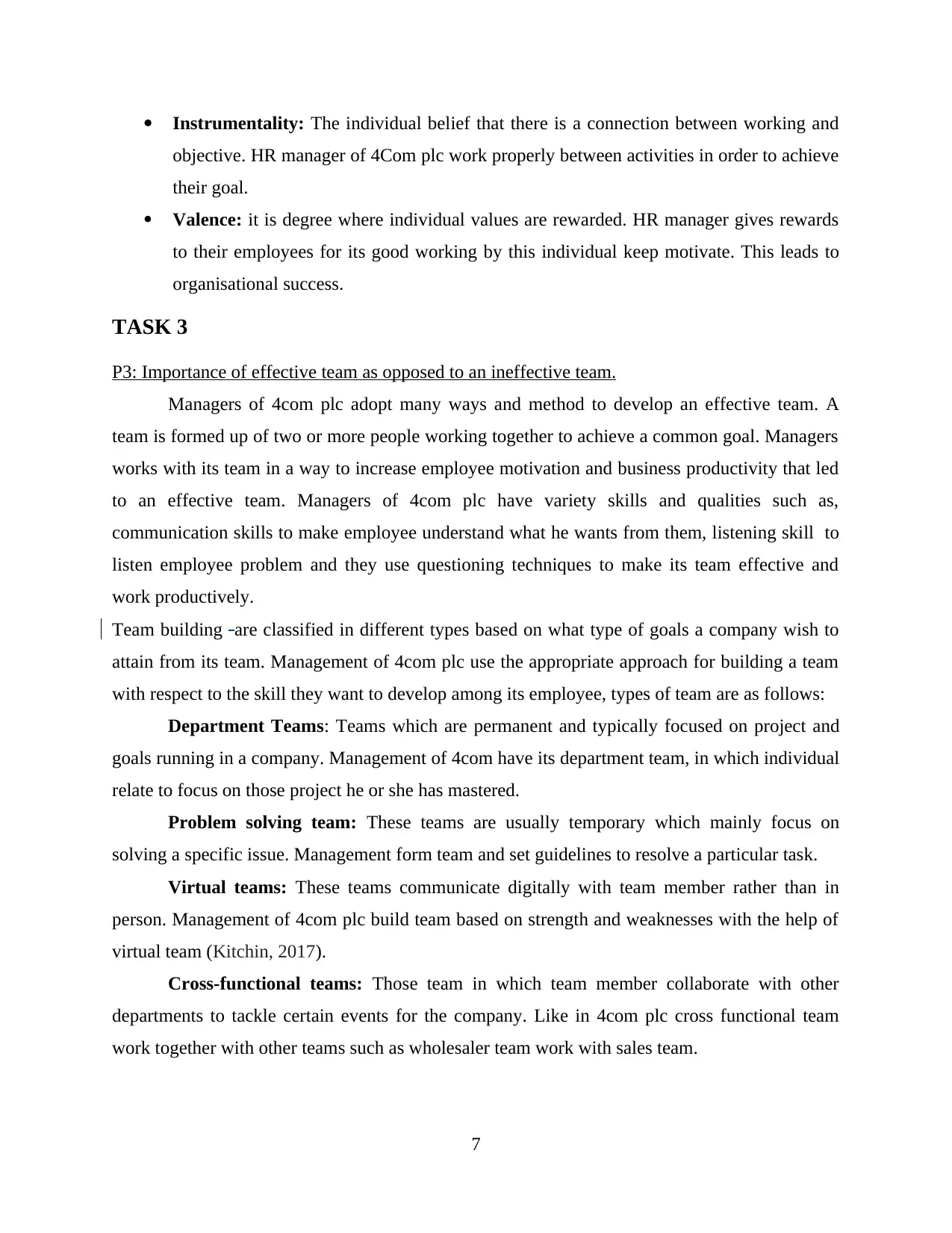
Instrumentality: The individual belief that there is a connection between working and
objective. HR manager of 4Com plc work properly between activities in order to achieve
their goal.
Valence: it is degree where individual values are rewarded. HR manager gives rewards
to their employees for its good working by this individual keep motivate. This leads to
organisational success.
TASK 3
P3: Importance of effective team as opposed to an ineffective team.
Managers of 4com plc adopt many ways and method to develop an effective team. A
team is formed up of two or more people working together to achieve a common goal. Managers
works with its team in a way to increase employee motivation and business productivity that led
to an effective team. Managers of 4com plc have variety skills and qualities such as,
communication skills to make employee understand what he wants from them, listening skill to
listen employee problem and they use questioning techniques to make its team effective and
work productively.
Team building are classified in different types based on what type of goals a company wish to
attain from its team. Management of 4com plc use the appropriate approach for building a team
with respect to the skill they want to develop among its employee, types of team are as follows:
Department Teams: Teams which are permanent and typically focused on project and
goals running in a company. Management of 4com have its department team, in which individual
relate to focus on those project he or she has mastered.
Problem solving team: These teams are usually temporary which mainly focus on
solving a specific issue. Management form team and set guidelines to resolve a particular task.
Virtual teams: These teams communicate digitally with team member rather than in
person. Management of 4com plc build team based on strength and weaknesses with the help of
virtual team (Kitchin, 2017).
Cross-functional teams: Those team in which team member collaborate with other
departments to tackle certain events for the company. Like in 4com plc cross functional team
work together with other teams such as wholesaler team work with sales team.
7
objective. HR manager of 4Com plc work properly between activities in order to achieve
their goal.
Valence: it is degree where individual values are rewarded. HR manager gives rewards
to their employees for its good working by this individual keep motivate. This leads to
organisational success.
TASK 3
P3: Importance of effective team as opposed to an ineffective team.
Managers of 4com plc adopt many ways and method to develop an effective team. A
team is formed up of two or more people working together to achieve a common goal. Managers
works with its team in a way to increase employee motivation and business productivity that led
to an effective team. Managers of 4com plc have variety skills and qualities such as,
communication skills to make employee understand what he wants from them, listening skill to
listen employee problem and they use questioning techniques to make its team effective and
work productively.
Team building are classified in different types based on what type of goals a company wish to
attain from its team. Management of 4com plc use the appropriate approach for building a team
with respect to the skill they want to develop among its employee, types of team are as follows:
Department Teams: Teams which are permanent and typically focused on project and
goals running in a company. Management of 4com have its department team, in which individual
relate to focus on those project he or she has mastered.
Problem solving team: These teams are usually temporary which mainly focus on
solving a specific issue. Management form team and set guidelines to resolve a particular task.
Virtual teams: These teams communicate digitally with team member rather than in
person. Management of 4com plc build team based on strength and weaknesses with the help of
virtual team (Kitchin, 2017).
Cross-functional teams: Those team in which team member collaborate with other
departments to tackle certain events for the company. Like in 4com plc cross functional team
work together with other teams such as wholesaler team work with sales team.
7
⊘ This is a preview!⊘
Do you want full access?
Subscribe today to unlock all pages.

Trusted by 1+ million students worldwide
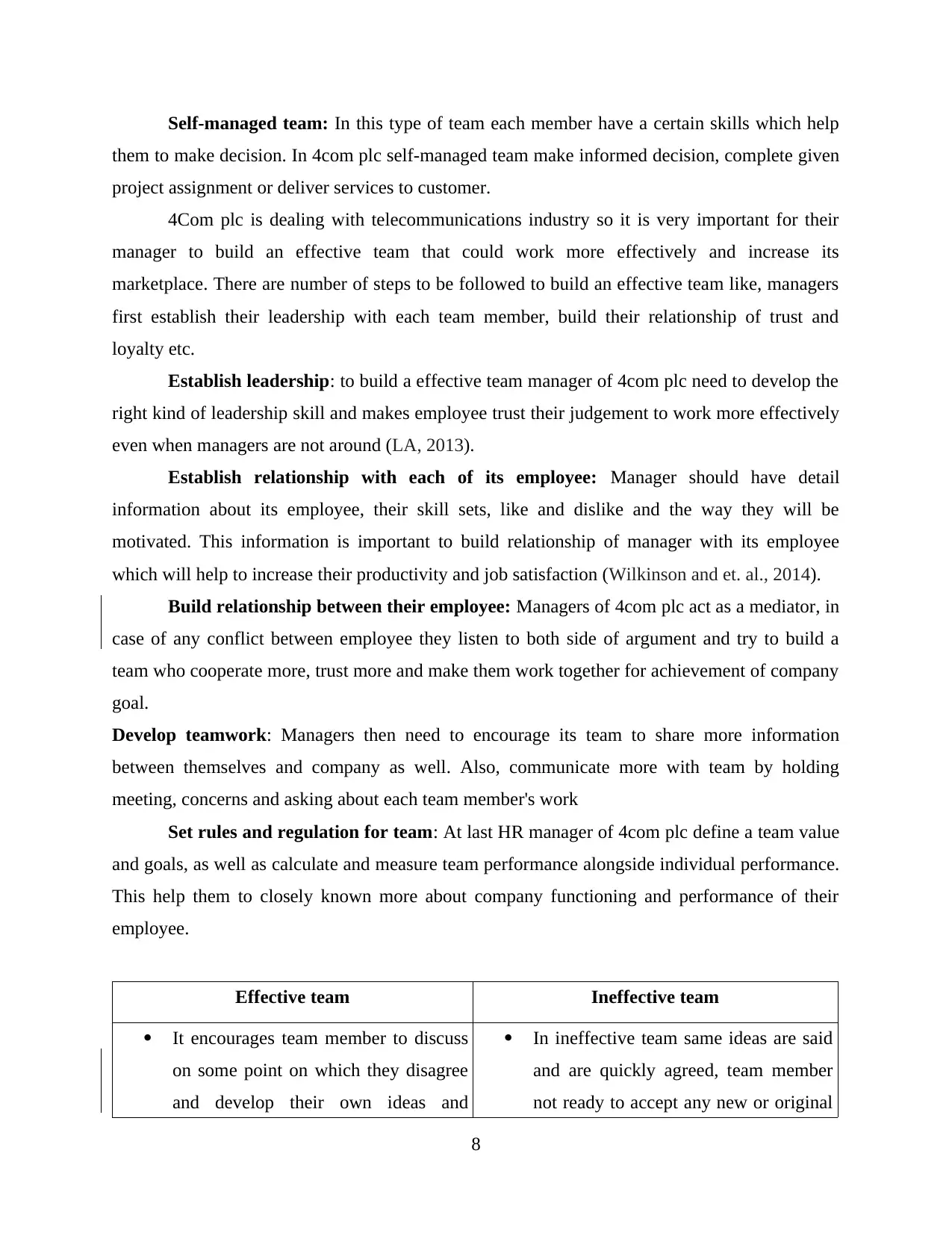
Self-managed team: In this type of team each member have a certain skills which help
them to make decision. In 4com plc self-managed team make informed decision, complete given
project assignment or deliver services to customer.
4Com plc is dealing with telecommunications industry so it is very important for their
manager to build an effective team that could work more effectively and increase its
marketplace. There are number of steps to be followed to build an effective team like, managers
first establish their leadership with each team member, build their relationship of trust and
loyalty etc.
Establish leadership: to build a effective team manager of 4com plc need to develop the
right kind of leadership skill and makes employee trust their judgement to work more effectively
even when managers are not around (LA, 2013).
Establish relationship with each of its employee: Manager should have detail
information about its employee, their skill sets, like and dislike and the way they will be
motivated. This information is important to build relationship of manager with its employee
which will help to increase their productivity and job satisfaction (Wilkinson and et. al., 2014).
Build relationship between their employee: Managers of 4com plc act as a mediator, in
case of any conflict between employee they listen to both side of argument and try to build a
team who cooperate more, trust more and make them work together for achievement of company
goal.
Develop teamwork: Managers then need to encourage its team to share more information
between themselves and company as well. Also, communicate more with team by holding
meeting, concerns and asking about each team member's work
Set rules and regulation for team: At last HR manager of 4com plc define a team value
and goals, as well as calculate and measure team performance alongside individual performance.
This help them to closely known more about company functioning and performance of their
employee.
Effective team Ineffective team
It encourages team member to discuss
on some point on which they disagree
and develop their own ideas and
In ineffective team same ideas are said
and are quickly agreed, team member
not ready to accept any new or original
8
them to make decision. In 4com plc self-managed team make informed decision, complete given
project assignment or deliver services to customer.
4Com plc is dealing with telecommunications industry so it is very important for their
manager to build an effective team that could work more effectively and increase its
marketplace. There are number of steps to be followed to build an effective team like, managers
first establish their leadership with each team member, build their relationship of trust and
loyalty etc.
Establish leadership: to build a effective team manager of 4com plc need to develop the
right kind of leadership skill and makes employee trust their judgement to work more effectively
even when managers are not around (LA, 2013).
Establish relationship with each of its employee: Manager should have detail
information about its employee, their skill sets, like and dislike and the way they will be
motivated. This information is important to build relationship of manager with its employee
which will help to increase their productivity and job satisfaction (Wilkinson and et. al., 2014).
Build relationship between their employee: Managers of 4com plc act as a mediator, in
case of any conflict between employee they listen to both side of argument and try to build a
team who cooperate more, trust more and make them work together for achievement of company
goal.
Develop teamwork: Managers then need to encourage its team to share more information
between themselves and company as well. Also, communicate more with team by holding
meeting, concerns and asking about each team member's work
Set rules and regulation for team: At last HR manager of 4com plc define a team value
and goals, as well as calculate and measure team performance alongside individual performance.
This help them to closely known more about company functioning and performance of their
employee.
Effective team Ineffective team
It encourages team member to discuss
on some point on which they disagree
and develop their own ideas and
In ineffective team same ideas are said
and are quickly agreed, team member
not ready to accept any new or original
8
Paraphrase This Document
Need a fresh take? Get an instant paraphrase of this document with our AI Paraphraser
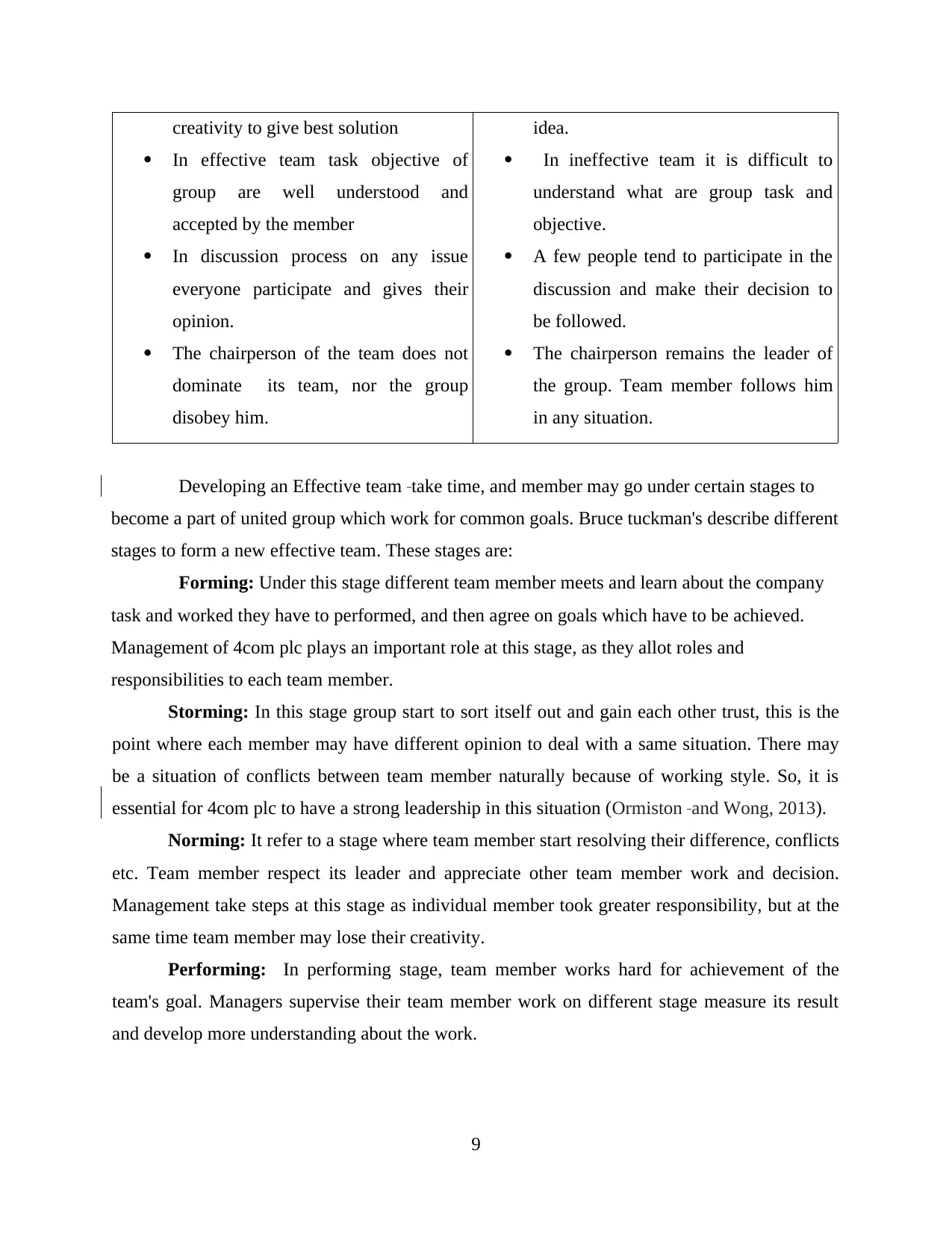
creativity to give best solution
In effective team task objective of
group are well understood and
accepted by the member
In discussion process on any issue
everyone participate and gives their
opinion.
The chairperson of the team does not
dominate its team, nor the group
disobey him.
idea.
In ineffective team it is difficult to
understand what are group task and
objective.
A few people tend to participate in the
discussion and make their decision to
be followed.
The chairperson remains the leader of
the group. Team member follows him
in any situation.
Developing an Effective team take time, and member may go under certain stages to
become a part of united group which work for common goals. Bruce tuckman's describe different
stages to form a new effective team. These stages are:
Forming: Under this stage different team member meets and learn about the company
task and worked they have to performed, and then agree on goals which have to be achieved.
Management of 4com plc plays an important role at this stage, as they allot roles and
responsibilities to each team member.
Storming: In this stage group start to sort itself out and gain each other trust, this is the
point where each member may have different opinion to deal with a same situation. There may
be a situation of conflicts between team member naturally because of working style. So, it is
essential for 4com plc to have a strong leadership in this situation (Ormiston and Wong, 2013).
Norming: It refer to a stage where team member start resolving their difference, conflicts
etc. Team member respect its leader and appreciate other team member work and decision.
Management take steps at this stage as individual member took greater responsibility, but at the
same time team member may lose their creativity.
Performing: In performing stage, team member works hard for achievement of the
team's goal. Managers supervise their team member work on different stage measure its result
and develop more understanding about the work.
9
In effective team task objective of
group are well understood and
accepted by the member
In discussion process on any issue
everyone participate and gives their
opinion.
The chairperson of the team does not
dominate its team, nor the group
disobey him.
idea.
In ineffective team it is difficult to
understand what are group task and
objective.
A few people tend to participate in the
discussion and make their decision to
be followed.
The chairperson remains the leader of
the group. Team member follows him
in any situation.
Developing an Effective team take time, and member may go under certain stages to
become a part of united group which work for common goals. Bruce tuckman's describe different
stages to form a new effective team. These stages are:
Forming: Under this stage different team member meets and learn about the company
task and worked they have to performed, and then agree on goals which have to be achieved.
Management of 4com plc plays an important role at this stage, as they allot roles and
responsibilities to each team member.
Storming: In this stage group start to sort itself out and gain each other trust, this is the
point where each member may have different opinion to deal with a same situation. There may
be a situation of conflicts between team member naturally because of working style. So, it is
essential for 4com plc to have a strong leadership in this situation (Ormiston and Wong, 2013).
Norming: It refer to a stage where team member start resolving their difference, conflicts
etc. Team member respect its leader and appreciate other team member work and decision.
Management take steps at this stage as individual member took greater responsibility, but at the
same time team member may lose their creativity.
Performing: In performing stage, team member works hard for achievement of the
team's goal. Managers supervise their team member work on different stage measure its result
and develop more understanding about the work.
9
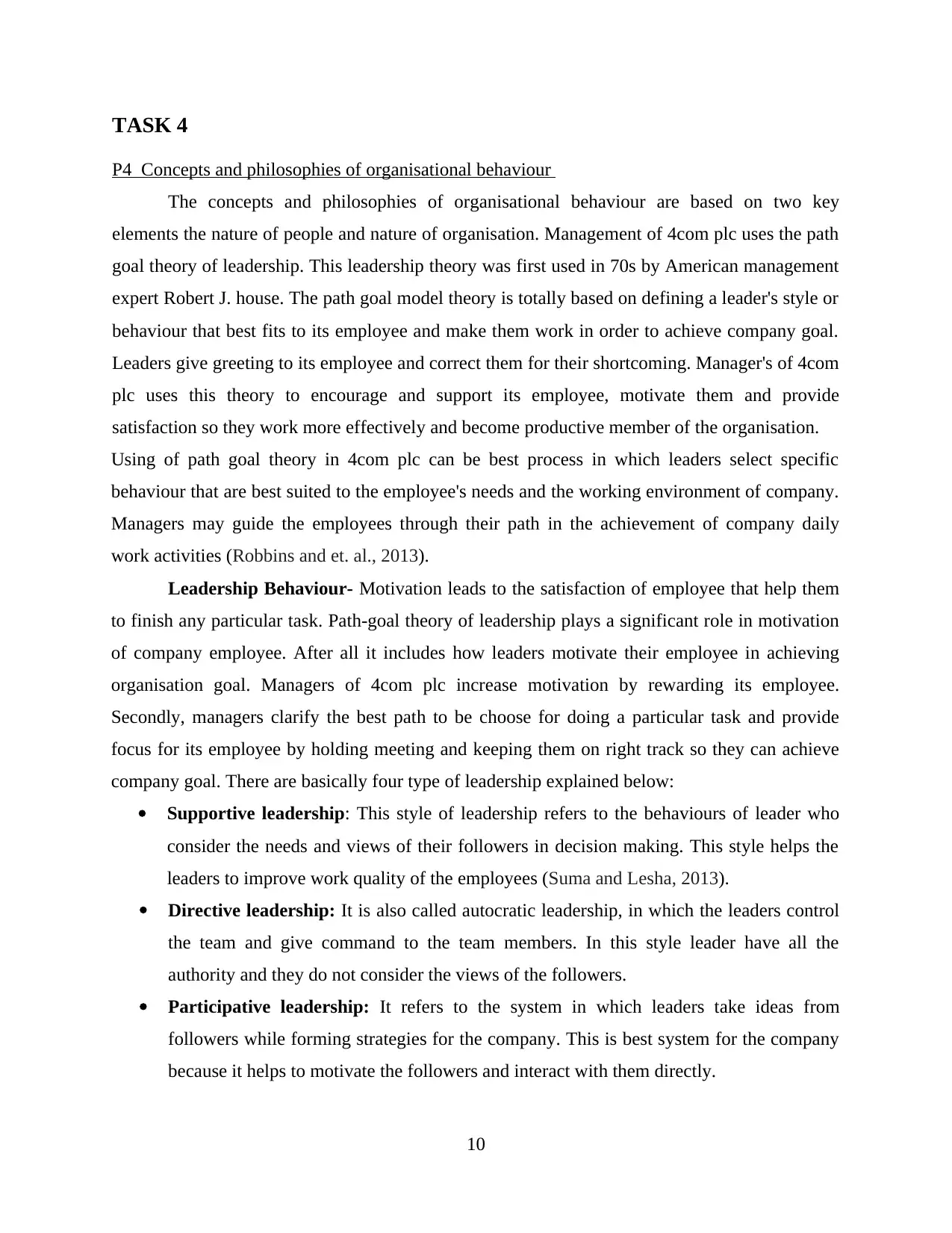
TASK 4
P4 Concepts and philosophies of organisational behaviour
The concepts and philosophies of organisational behaviour are based on two key
elements the nature of people and nature of organisation. Management of 4com plc uses the path
goal theory of leadership. This leadership theory was first used in 70s by American management
expert Robert J. house. The path goal model theory is totally based on defining a leader's style or
behaviour that best fits to its employee and make them work in order to achieve company goal.
Leaders give greeting to its employee and correct them for their shortcoming. Manager's of 4com
plc uses this theory to encourage and support its employee, motivate them and provide
satisfaction so they work more effectively and become productive member of the organisation.
Using of path goal theory in 4com plc can be best process in which leaders select specific
behaviour that are best suited to the employee's needs and the working environment of company.
Managers may guide the employees through their path in the achievement of company daily
work activities (Robbins and et. al., 2013).
Leadership Behaviour- Motivation leads to the satisfaction of employee that help them
to finish any particular task. Path-goal theory of leadership plays a significant role in motivation
of company employee. After all it includes how leaders motivate their employee in achieving
organisation goal. Managers of 4com plc increase motivation by rewarding its employee.
Secondly, managers clarify the best path to be choose for doing a particular task and provide
focus for its employee by holding meeting and keeping them on right track so they can achieve
company goal. There are basically four type of leadership explained below:
Supportive leadership: This style of leadership refers to the behaviours of leader who
consider the needs and views of their followers in decision making. This style helps the
leaders to improve work quality of the employees (Suma and Lesha, 2013).
Directive leadership: It is also called autocratic leadership, in which the leaders control
the team and give command to the team members. In this style leader have all the
authority and they do not consider the views of the followers.
Participative leadership: It refers to the system in which leaders take ideas from
followers while forming strategies for the company. This is best system for the company
because it helps to motivate the followers and interact with them directly.
10
P4 Concepts and philosophies of organisational behaviour
The concepts and philosophies of organisational behaviour are based on two key
elements the nature of people and nature of organisation. Management of 4com plc uses the path
goal theory of leadership. This leadership theory was first used in 70s by American management
expert Robert J. house. The path goal model theory is totally based on defining a leader's style or
behaviour that best fits to its employee and make them work in order to achieve company goal.
Leaders give greeting to its employee and correct them for their shortcoming. Manager's of 4com
plc uses this theory to encourage and support its employee, motivate them and provide
satisfaction so they work more effectively and become productive member of the organisation.
Using of path goal theory in 4com plc can be best process in which leaders select specific
behaviour that are best suited to the employee's needs and the working environment of company.
Managers may guide the employees through their path in the achievement of company daily
work activities (Robbins and et. al., 2013).
Leadership Behaviour- Motivation leads to the satisfaction of employee that help them
to finish any particular task. Path-goal theory of leadership plays a significant role in motivation
of company employee. After all it includes how leaders motivate their employee in achieving
organisation goal. Managers of 4com plc increase motivation by rewarding its employee.
Secondly, managers clarify the best path to be choose for doing a particular task and provide
focus for its employee by holding meeting and keeping them on right track so they can achieve
company goal. There are basically four type of leadership explained below:
Supportive leadership: This style of leadership refers to the behaviours of leader who
consider the needs and views of their followers in decision making. This style helps the
leaders to improve work quality of the employees (Suma and Lesha, 2013).
Directive leadership: It is also called autocratic leadership, in which the leaders control
the team and give command to the team members. In this style leader have all the
authority and they do not consider the views of the followers.
Participative leadership: It refers to the system in which leaders take ideas from
followers while forming strategies for the company. This is best system for the company
because it helps to motivate the followers and interact with them directly.
10
⊘ This is a preview!⊘
Do you want full access?
Subscribe today to unlock all pages.

Trusted by 1+ million students worldwide
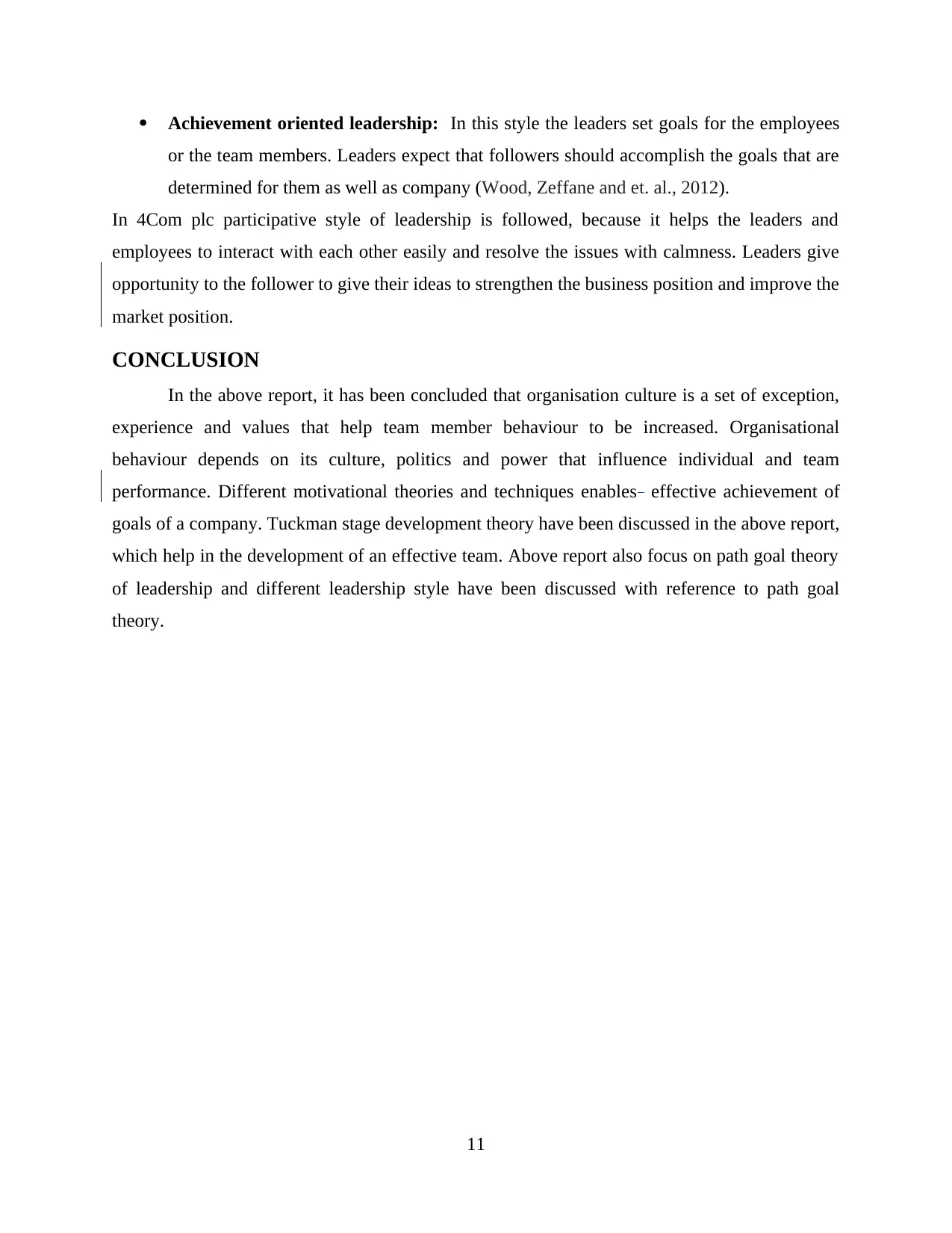
Achievement oriented leadership: In this style the leaders set goals for the employees
or the team members. Leaders expect that followers should accomplish the goals that are
determined for them as well as company (Wood, Zeffane and et. al., 2012).
In 4Com plc participative style of leadership is followed, because it helps the leaders and
employees to interact with each other easily and resolve the issues with calmness. Leaders give
opportunity to the follower to give their ideas to strengthen the business position and improve the
market position.
CONCLUSION
In the above report, it has been concluded that organisation culture is a set of exception,
experience and values that help team member behaviour to be increased. Organisational
behaviour depends on its culture, politics and power that influence individual and team
performance. Different motivational theories and techniques enables effective achievement of
goals of a company. Tuckman stage development theory have been discussed in the above report,
which help in the development of an effective team. Above report also focus on path goal theory
of leadership and different leadership style have been discussed with reference to path goal
theory.
11
or the team members. Leaders expect that followers should accomplish the goals that are
determined for them as well as company (Wood, Zeffane and et. al., 2012).
In 4Com plc participative style of leadership is followed, because it helps the leaders and
employees to interact with each other easily and resolve the issues with calmness. Leaders give
opportunity to the follower to give their ideas to strengthen the business position and improve the
market position.
CONCLUSION
In the above report, it has been concluded that organisation culture is a set of exception,
experience and values that help team member behaviour to be increased. Organisational
behaviour depends on its culture, politics and power that influence individual and team
performance. Different motivational theories and techniques enables effective achievement of
goals of a company. Tuckman stage development theory have been discussed in the above report,
which help in the development of an effective team. Above report also focus on path goal theory
of leadership and different leadership style have been discussed with reference to path goal
theory.
11
Paraphrase This Document
Need a fresh take? Get an instant paraphrase of this document with our AI Paraphraser
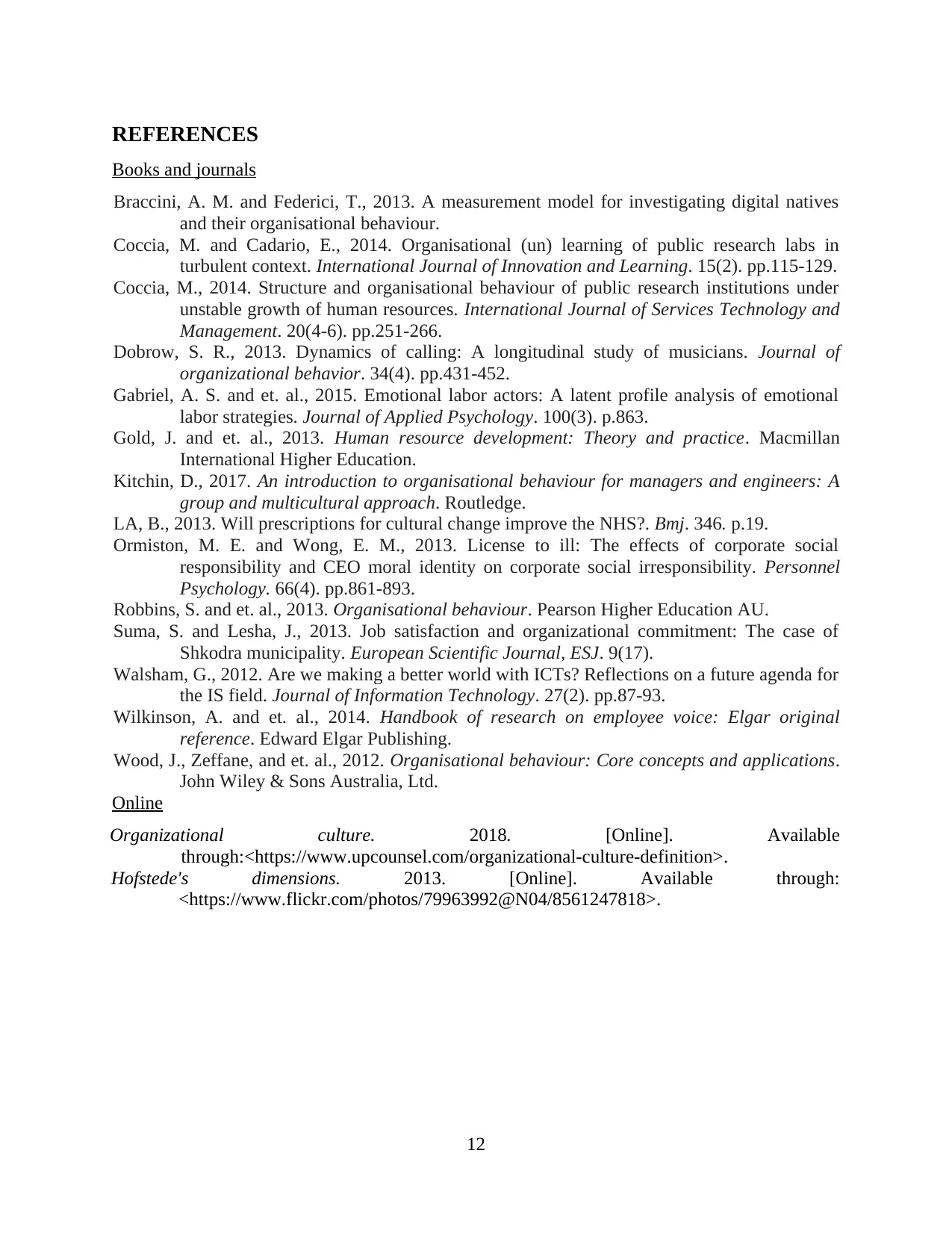
REFERENCES
Books and journals
Braccini, A. M. and Federici, T., 2013. A measurement model for investigating digital natives
and their organisational behaviour.
Coccia, M. and Cadario, E., 2014. Organisational (un) learning of public research labs in
turbulent context. International Journal of Innovation and Learning. 15(2). pp.115-129.
Coccia, M., 2014. Structure and organisational behaviour of public research institutions under
unstable growth of human resources. International Journal of Services Technology and
Management. 20(4-6). pp.251-266.
Dobrow, S. R., 2013. Dynamics of calling: A longitudinal study of musicians. Journal of
organizational behavior. 34(4). pp.431-452.
Gabriel, A. S. and et. al., 2015. Emotional labor actors: A latent profile analysis of emotional
labor strategies. Journal of Applied Psychology. 100(3). p.863.
Gold, J. and et. al., 2013. Human resource development: Theory and practice. Macmillan
International Higher Education.
Kitchin, D., 2017. An introduction to organisational behaviour for managers and engineers: A
group and multicultural approach. Routledge.
LA, B., 2013. Will prescriptions for cultural change improve the NHS?. Bmj. 346. p.19.
Ormiston, M. E. and Wong, E. M., 2013. License to ill: The effects of corporate social
responsibility and CEO moral identity on corporate social irresponsibility. Personnel
Psychology. 66(4). pp.861-893.
Robbins, S. and et. al., 2013. Organisational behaviour. Pearson Higher Education AU.
Suma, S. and Lesha, J., 2013. Job satisfaction and organizational commitment: The case of
Shkodra municipality. European Scientific Journal, ESJ. 9(17).
Walsham, G., 2012. Are we making a better world with ICTs? Reflections on a future agenda for
the IS field. Journal of Information Technology. 27(2). pp.87-93.
Wilkinson, A. and et. al., 2014. Handbook of research on employee voice: Elgar original
reference. Edward Elgar Publishing.
Wood, J., Zeffane, and et. al., 2012. Organisational behaviour: Core concepts and applications.
John Wiley & Sons Australia, Ltd.
Online
Organizational culture. 2018. [Online]. Available
through:<https://www.upcounsel.com/organizational-culture-definition>.
Hofstede's dimensions. 2013. [Online]. Available through:
<https://www.flickr.com/photos/79963992@N04/8561247818>.
12
Books and journals
Braccini, A. M. and Federici, T., 2013. A measurement model for investigating digital natives
and their organisational behaviour.
Coccia, M. and Cadario, E., 2014. Organisational (un) learning of public research labs in
turbulent context. International Journal of Innovation and Learning. 15(2). pp.115-129.
Coccia, M., 2014. Structure and organisational behaviour of public research institutions under
unstable growth of human resources. International Journal of Services Technology and
Management. 20(4-6). pp.251-266.
Dobrow, S. R., 2013. Dynamics of calling: A longitudinal study of musicians. Journal of
organizational behavior. 34(4). pp.431-452.
Gabriel, A. S. and et. al., 2015. Emotional labor actors: A latent profile analysis of emotional
labor strategies. Journal of Applied Psychology. 100(3). p.863.
Gold, J. and et. al., 2013. Human resource development: Theory and practice. Macmillan
International Higher Education.
Kitchin, D., 2017. An introduction to organisational behaviour for managers and engineers: A
group and multicultural approach. Routledge.
LA, B., 2013. Will prescriptions for cultural change improve the NHS?. Bmj. 346. p.19.
Ormiston, M. E. and Wong, E. M., 2013. License to ill: The effects of corporate social
responsibility and CEO moral identity on corporate social irresponsibility. Personnel
Psychology. 66(4). pp.861-893.
Robbins, S. and et. al., 2013. Organisational behaviour. Pearson Higher Education AU.
Suma, S. and Lesha, J., 2013. Job satisfaction and organizational commitment: The case of
Shkodra municipality. European Scientific Journal, ESJ. 9(17).
Walsham, G., 2012. Are we making a better world with ICTs? Reflections on a future agenda for
the IS field. Journal of Information Technology. 27(2). pp.87-93.
Wilkinson, A. and et. al., 2014. Handbook of research on employee voice: Elgar original
reference. Edward Elgar Publishing.
Wood, J., Zeffane, and et. al., 2012. Organisational behaviour: Core concepts and applications.
John Wiley & Sons Australia, Ltd.
Online
Organizational culture. 2018. [Online]. Available
through:<https://www.upcounsel.com/organizational-culture-definition>.
Hofstede's dimensions. 2013. [Online]. Available through:
<https://www.flickr.com/photos/79963992@N04/8561247818>.
12
1 out of 14
Related Documents
Your All-in-One AI-Powered Toolkit for Academic Success.
+13062052269
info@desklib.com
Available 24*7 on WhatsApp / Email
![[object Object]](/_next/static/media/star-bottom.7253800d.svg)
Unlock your academic potential
© 2024 | Zucol Services PVT LTD | All rights reserved.





